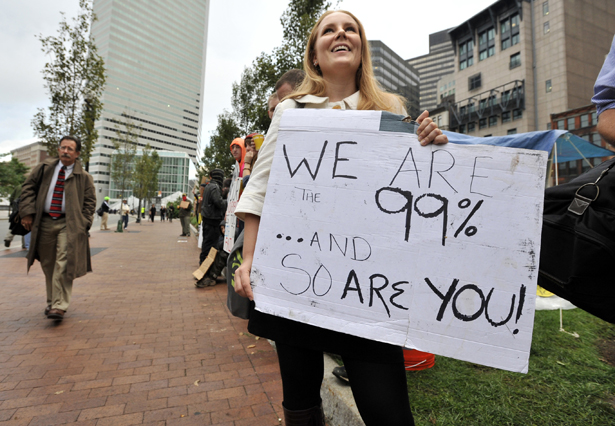
A woman who identified herself only as Jenna stopped on her way to work to join demonstrators with Occupy Boston on Monday, Oct. 3, 2011. (AP Photo/Josh Reynolds)
Women’s rights have always been a bit of an add-on for the left. At this spring’s Left Forum, only fifteen of 440 panels touched on any feminist issue, broadly understood. New Left Review is famous, at least in my apartment, for its high testosterone content (despite being edited by a woman); ditto Verso, the left’s flagship publishing house, where women authors are as rare as Siberian tigers. And it’s not just the left—women’s rights, in fact women period, tend to get set aside whenever economics or “class” is the focus. Occupy Wall Street’s initial declaration, a long list of grievances from colonialism to the maltreatment of “nonhuman animals,” mentioned women’s inequality only in the context of the workplace—no mention of the systematic inequality that affects every area of life. Occupy Austin went further: a paper put out by its Language of Unity Working Group describes Occupy Austin as “radically inclusive,” open to everyone from disaffected Tea Partiers to Greens and anarchists, as well as homeless people and “soccer moms looking for a cause” (not too patronizing!) and highlighting only “the things that bring people together.” “For instance, you will never see Occupy approach the issue of abortion. It is too derisive (sic). Rather than championing one side, the huge innovation of the Occupy movement is its focus only on issues which unite people. We care most about people and care what most people support.”
Hmmm. Let’s leave aside for the moment the question of whether caring “most about people” is compatible with silence on state-mandated transvaginal ultrasounds, personhood amendments and so on—let alone forced childbirth. I would think that when one in three women has at least one abortion, and when virtually all women have used birth control, we are talking about issues that affect “most people”—including most men, who benefit greatly from women’s ability to control their fertility. Let’s not look too closely, either, at the assumption that the 99 percent constitutes a coherent category: that a software engineer, a car salesman, a Chinese-food delivery man, a rabbi, a municipal clerk, a fashion photographer and a cleaning lady really have the same interests. The notion of common cause, even among the actual working class, is as much a romantic and aspirational construction, as much a matter of “identity politics,” as the oft-derided ideal of “sisterhood.”
You know the slogan “Women’s rights are human rights”? Well, women’s rights are economic rights, too. Sometimes it’s obvious: when Wisconsin Governor Scott Walker signs a bill reducing access to the courts for women claiming wage discrimination, that’s clearly an attack on women’s paychecks. When Mitt Romney can’t say whether or not he would have supported the Lilly Ledbetter Fair Pay Act—which, let’s not forget, simply restored women’s right to sue for pay discrimination to where it was before the Supreme Court limited it—and then names four judges who voted against Lilly Ledbetter as models for his future appointments, he is saying businesses should have broad leeway to pay women less for doing the same work as men.
But when it comes to reproductive issues, apparently, the connection needs to be spelled out. So here it is: limiting women’s access to birth control and abortion is not “culture war” theater, and it is not just a “social issue” either. It’s an economic issue.
1. Early childbearing, most of which is unplanned, has a big effect on women’s education. According to a Centers for Disease Control fact sheet, “Only about 50% of teen mothers receive a high school diploma by 22 years of age, versus approximately 90% of women who had not given birth during adolescence.” While this partly reflects the fact that poorer, less school-oriented girls are more likely to give birth, it’s clear that having a baby as a teenager creates serious economic stress.
2. Birth control is expensive. Many insurance plans don’t cover all methods; some don’t cover any method (looking at you, Catholic Church!). Annual cost of the Pill can range from a low $108 a year for generic ortho-cyclen to an astronomical $1,140 for Loestrin. The IUD, a highly effective method many plans don’t cover, costs around $1,000 for insertion.
3. Abortion is expensive. A first-trimester abortion costs around $500. After that the price climbs quickly: at twenty weeks, it’s more than $1,000. A late abortion for medical complications can cost several thousand—assuming the woman can find one. And this is just for the procedure, not for the hassles heaped on women by clinic closings, waiting periods and other restrictions—transportation, childcare, hotel bills. These burdens fall mostly on women themselves. The Hyde Amendment bars federal funding; most insurance plans do not cover it; only seventeen states fund Medicaid coverage for medically necessary abortions.
4. Childbirth is expensive. Childcare is expensive. Having a baby lowers women’s earnings dramatically, but it boosts men’s. Welfare? A dream of the past. Child support from the other parent? Good luck with that. According to the Census Bureau, “Of the $35.1 billion in child support due in 2009, 61.0 percent was reported as received, averaging $3,630 per custodial parent.” (One in six of those custodial parents is a man.)
And if all that wasn’t enough, women are charged more for the same or virtually the same products, from health insurance ($1 billion more a year!) to dry cleaning. To say nothing of the economic burdens of stalking, domestic violence, rape and the fear of rape.
It may be too late for the late-middle-aged old new left to take feminism to heart. There’s hope for Occupy, though, with its plethora of young women activists and ideological openness. In New York, Women Occupying Wall Street, the women’s caucus of OWS, is planning a Feminist General Assembly for May 17 at 6:30pm in Washington Square. I’ll be there, and will report back.


